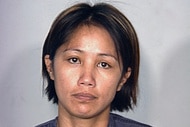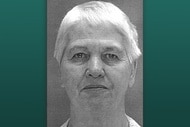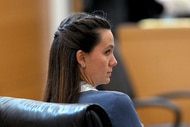Create a free profile to get unlimited access to exclusive videos, breaking news, sweepstakes, and more!
Elisabeth Fritzl's 24-Year Nightmare Of Imprisonment And Unimaginable Abuse Reimagined In 'Girl In The Basement'
A new Lifetime movie draws on elements of the unspeakable ordeal of a young woman held captive and abused for decades by her father, Josef Fritzl, in Austria.

As details of the unimaginable horror endured by Elisabeth Fritzl emerged in 2008 from a town in Lower Austria, the world was shocked. Imprisoned in the windowless basement beneath the boarding home where she was raised, the young woman was assaulted, abused, humiliated, and raped repeatedly by her father. The "abominable events" that took place in that basement prison shook millions and led many to question the human capacity for savagery and survival.
The coercion, imprisonment, and incestuous rape endured by Elisabeth, the years of captivity she endured with her children, and the circumstances of her eventual escape after decades of hell are the inspiration for Lifetime's new feature film, “Girl in the Basement,” which airs on Saturday. The new film moves the appalling Fritzl story to the American suburbs while altering, omitting, and expanding upon details of what actually happened between 1984 and 2008 in the quiet town of Amstetten.
On Aug. 28, 1984, Elisabeth, then an 18-year-old waitress, was living with her mother, Rosemarie, and father, Josef, when he lured her to the basement of their home to help him place a door for an ongoing home project. Josef Fritzl, then a 49-year-old engineer and property developer, had spent years on a basement conversion project; placing that door, however, was the final step in building the prison where the young woman would be tortured for decades. As was outlined in Allan Hall’s book, “Monster,” while his daughter was holding the door in place, Josef Fritzl held an ether-soaked rag on Elisabeth's face until she passed out, handcuffed her, then locked her in the dark subterranean prison.
Rosemarie Fritzl was soon shown a handwritten letter from her daughter, postmarked from the town of Braunau in Upper Austria, saying she had left her parents and the town, and to not look for her or she’d flee the country. A police report was filed and Elisabeth remained on the Interpol missing person list but was presumed to have joined a religious sect, a story her father suggested to authorities.
The next years were just the beginning of Elisabeth’s nightmare, which stretched on for nearly a generation. Her father visited the basement chamber nearly every day, repeatedly raping and abusing her over the years. In 1988, four years into her ordeal and two years after having a miscarriage, Elisabeth gave birth to her first child, Kerstin. Over the next 14 years, she birthed six more children — Stefan, Lisa, Monika, Alexander, Michael, and Felix. Michael, Alexander’s twin brother, died three days after being born with breathing problems, reportedly aided by Josef Fritzl's negligence; the newborn’s body was taken and cremated by his father.
When they were infants, Josef Fritzl decided that Lisa, Monika, and Alexander would be removed from the cellar and brought upstairs to be raised by him and his wife, creating what became known as the "upstairs family." Rosemarie believed her husband when he said each infant had appeared outside the home with a note from Elisabeth, asking for them to be taken in.
Josef Fritzl “very plausible” explained this to officials and the couple was allowed to foster the children as foundlings. After Monika appeared in 1994, Rosemarie said that she received a call from a woman sounding like Elisabeth asking her to take care of the infant, Der Spiegel reported in 2008; the grandmother reported this call to the police, saying she was perplexed as to how her daughter got their new, unlisted number.
While held captive, Elisabeth and the children’s basement prison contained a television, radio, video cassette player, refrigerator, and a hot plate to heat up food — which would be withheld for days at a time as punishment. She was able to nurture her children and teach them to read and write, but over the years was routinely subjected to torture by her father; at times, as reported in Der Spiegel, she said she was forced to watch porn videos he brought downstairs, then made to re-enact their scenes with him, in front of her children.
It was after her fourth child, Monika, was born that Elisabeth asked her father for an enlargement of the basement prison. He agreed. She and the children then dug out the soil with their bare hands, eventually enlarging the space from 380 to 590 square feet. But when Felix, her sixth child by her father, was born in 2002, Josef decided he would be kept in the basement prison with Elisabeth and her two oldest children, Kerstin, and Stefan — his wife could not look after another child, he later said, as Der Spiegel reported.
On April 19, 2008, for the first time in 24 years, Elisabeth saw the world outside her basement prison — but under desperate circumstances, as her eldest daughter, Kerstin, had lost consciousness. She and her father brought the 19-year-old upstairs and the teenager was rushed to Landesklinikum Amstetten hospital, where she was diagnosed with kidney failure. Elisabeth was quickly returned to the basement, only to be allowed out again, along with Stefan and Felix, a week later; hospital staff became suspicious of the note Josef Fritzl brought them, which he said was from Kerstin’s mother. Both Josef and Elisabeth were brought to the police for questioning.
It took hours, and a promise she’d never have to see her father again, before Elisabeth was able to detail to Austrian authorities her appalling story. Josef Fritzl, then 73, was arrested on April 26, 2008. The following day, Elisabeth and her children were taken away from the home and into the care of the state.
Josef Fritzl said after his arrest that he had abused Elisabeth since the age of 12, and decided to imprison her because she "did not adhere to any rules anymore," as was outlined in interview extracts sent to the Australian weekly, News. This logic of a deranged, controlling father is mirrored in “Girl in the Basement.” Fritzl also blamed his behavior on a disciplined upbringing in the Nazi era until the age of 10, as well as his treatment by his mother. Court reports later revealed that before her death in 1980, Fritzl locked his mother in the attic of her own home and bricked up the window.
Less than a year after his arrest, Josef Fritzl pleaded guilty to murder charges by the negligence of his infant son and grandson, Michael, and the decades of enslavement, incest, rape, coercion, and false imprisonment of Elisabeth. He was sentenced to life in prison at Garsten Abbey, a converted monastery in Upper Austria, where he remains today.
Fritzl, it was claimed by his sister-in-law as news of his disturbing crimes tore across the world, had been jailed for the 1964 rape of a young nurse at knifepoint and had been a suspect in the attempted rape of another young woman. He reportedly told psychiatrist Adelheid Kastner, "I was born to rape, and I held myself back for a relatively long time. I could have behaved a lot worse than locking up my daughter."
Elisabeth Fritzl and her children were all reunited after her father’s trial and moved to a village in northern Austria, where they began therapy. She reportedly had a strained relationship with her mother at first, given that she had so easily believed her husband’s lies about her disappearance. But, according to an article in The Independent, their relationship has recovered over time, and Rosemarie has even grown close with her children.
In May 2008, a handmade poster created by all of the survivors and Rosemarie Fritzl appeared in Amstetten's town square. It thanked the community for their support after the horror of what had occurred in the small town became known.
"We, the whole family, would like to take the opportunity to thank all of you for sympathy at our fate," they wrote. "Your compassion is helping us greatly to overcome these difficult times, and it shows us there also are good and honest people here who really care for us. We hope that soon there will be a time where we can find our way back into a normal life."




























